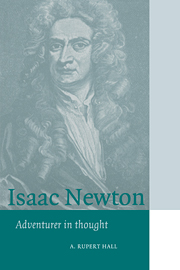Book contents
- Frontmatter
- Contents
- List of Figures
- General Editor's Preface
- Foreword
- Acknowledgement
- 1 The Hopeful Youth, 1642–1664
- 2 “The prime of my age for invention”, 1664–1667
- 3 Widening Horizons, 1667–1669
- 4 The Professor of Mathematics, 1669–1673
- 5 Publication and Polemic, 1672–1678
- 6 Life in Cambridge, 1675–1685
- 7 The Chemical Philosopher, 1669–1695
- 8 The Mathematical Principles of Natural Philosophy, 1679–1687
- 9 Private and Public life, 1685–1696
- 10 Fluxions and Fury, 1677–1712
- 11 Opticks, or a Treatise of Light, 1687–1704
- 12 Life in London, 1696–1718
- 13 A Man of Authority and Learning, 1692–1727
- 14 Later Books, 1706–1726
- 15 Kensington, 1725–1727
- Appendices
- Notes
- Bibliography
- Index
6 - Life in Cambridge, 1675–1685
Published online by Cambridge University Press: 12 January 2010
- Frontmatter
- Contents
- List of Figures
- General Editor's Preface
- Foreword
- Acknowledgement
- 1 The Hopeful Youth, 1642–1664
- 2 “The prime of my age for invention”, 1664–1667
- 3 Widening Horizons, 1667–1669
- 4 The Professor of Mathematics, 1669–1673
- 5 Publication and Polemic, 1672–1678
- 6 Life in Cambridge, 1675–1685
- 7 The Chemical Philosopher, 1669–1695
- 8 The Mathematical Principles of Natural Philosophy, 1679–1687
- 9 Private and Public life, 1685–1696
- 10 Fluxions and Fury, 1677–1712
- 11 Opticks, or a Treatise of Light, 1687–1704
- 12 Life in London, 1696–1718
- 13 A Man of Authority and Learning, 1692–1727
- 14 Later Books, 1706–1726
- 15 Kensington, 1725–1727
- Appendices
- Notes
- Bibliography
- Index
Summary
With the freedom granted to all Lucasian professors to decline holy orders, Newton knew that so long as he retained that office he was assured of the tenure of his fellowship at Trinity College till death or resignation – in fact, he would hold it for another twenty-six years. He did not resign his Cambridge posts until December 1701, still not a Senior in his college though non-resident since 1696. Further, to the best of our knowledge, Newton had carried out no teaching since the Revolution.
His appearances in the public life of his college and university are poorly documented. In March 1673 he joined his relative Humphrey Babington and others, Masters of Arts, in signing a protest against the heads of houses exercising their customary but doubtful powers of nominating two candidates for the post of Public Orator, for the Senate's election. The protest failed. At an unknown date Newton attempted to secure from the commissioners of taxes for Cambridge an exemption from a property tax, on the grounds that the revenue from the Lucasian professorial estate did not belong to his college. (Later, from 1688 to 1695, Newton himself was to be one of these commissioners, a mark of his eminence in the university; the vicechancellor was one of the body ex officio.) In 1676 Newton gave £40 – then a fairly comfortable annual salary – towards the projected new library building proposed by Barrow at Trinity, since famous as the Wren Library closing the rear court of the college. This gift was followed by a loan of £100 made about the end of 1679; Newton also presented a number of books to the library.
- Type
- Chapter
- Information
- Isaac NewtonAdventurer in Thought, pp. 143 - 178Publisher: Cambridge University PressPrint publication year: 1996



